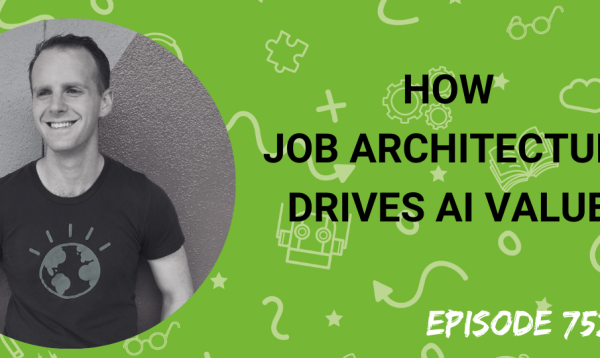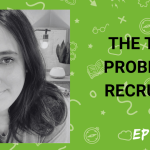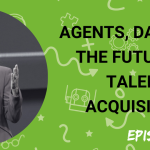As part of my continuing focus on getting a diverse range of opinions and voices on the show, this week I thought it would be interesting to get the views of a Global HR Director.
My guest for this episode is Graeme Cook, Group HR Director at ground engineering specialist Keller, a company who employ 10,000 people across 40 different companies. Graeme’s career has itself been a global one and he has worked in several different countries for his past employers, giving him a genuinely global perspective.
In the interview we discuss:
• Some of the key considerations and challenges of operating HR at a global level
• Skill shortages in the Oil, Gas and Engineering sectors
• The three key parts of the HR Director’s role and HR’s position within the organization
• Technology, automation and the future of HR
Graeme also talks about his transition from working in finance to working in HR and gives his views on the challenges of managing a multi-generational workforce.
Subscribe to this podcast in iTunes
Click here to pre-order “Exceptional Talent”
Transcript:
Matt Alder [00:00:00]:
Before we start the show this week, I wanted to let you know that the book I’ve co authored with Mervyn Dynon is now available for pre order. The book is called Exceptional Talent and looks at what companies are doing to attract, hire, develop and retain the very best people for their business. The book starts shipping in May, but you can reserve a discounted copy right now by going to bit ly exceptionaltalent and using the discount code FHR ET20. That’s bit ly exceptional talent and the discount code FHRE20. I’ll also put that information in the show Notes for this week’s episode.
Matt Alder [00:01:04]:
This is Matt Alder. Welcome to episode 81 of the Recruiting Future podcast. It’s always great to get feedback about the show, so a big thank you to everyone who’s got in touch recently. I’ve decided it would be fantastic if there was a place where we could all discuss the issues that come up in the interviews and find out what people’s opinions are to make this happen. I’ve recently created a Facebook page for the show. You can find it by searching for the Recruiting Future podcast on Facebook or by going to www.facebook.com rfpodcast for this week’s episode, I thought it would be interesting to get the perspective of a global HR director. My guest is Graeme Cook. He’s Global HRD of ground engineering company Keller. Graeme has worked all over the world in his career and shares some fascinating insights in an interview I know you’re going to enjoy. Hi Graeme and welcome to the podcast.
Graeme Cook [00:02:07]:
Hi Matt, good to be here.
Matt Alder [00:02:09]:
So could you introduce yourself and give us a little bit of background about what you do?
Graeme Cook [00:02:14]:
Yeah. So I’m Graeme Cook, I’m Group HR Director for Keller Group PLC. Keller Group are a geotechnical engineering company. Around 10,000 employees covering 40 countries. My background is mostly upstream oil and gas. I’m a native of Aberdeen, Scotland, but spent the early part of my career with a global oilfield services firm called Schlumbergy. With those guys I worked and lived abroad in West Africa, Middle East, Asia and in the UK and I spent 10 years with them. The early part of my career was in finance doing various controller type roles and then they offered a system of borderless careers and they moved us across product lines, geographies and functions and for the last 16 years been doing senior HR roles.
Matt Alder [00:03:00]:
That’s interesting and I obviously want to talk a bit more about what you’re doing at Keller and HR and all that kind of stuff. But to start with, what’s it like to have moved around globally like you have? What’s the reality of a global career and what’s the reality of doing HR on a global basis like that?
Graeme Cook [00:03:21]:
Global HR is a fascinating thing, and I think it’s something that’s really helped shape and define my career over the years. The reality, There’s a breadth of complexity, a breadth of diversity, but quite often challenges and opportunities are actually identical no matter where you work. What I would encourage any young person considering their career is to try and find a stage in their life when a global opportunity could emerge. Typically that’s earlier in someone’s life, but what you’d be amazed at is what it can lead to and the types of opportunities that people are willing to give you a try at. Having proven yourself on those diverse markets.
Matt Alder [00:03:58]:
What was the most interesting market that you worked in?
Graeme Cook [00:04:03]:
That’s a great question. No two are the same. I think Asia in the late 90s was a really challenging time. For those of you old enough to know, there was a sort of currency crisis that really started in Asia in the sort of mid to late 90s. I think it was around 97, 98. And what we saw was a massive drop in the financial markets that kind of went well beyond anything we experienced, I think, here in Europe in the late 2000s. And you saw effect it had on society. We were living in Jakarta, Indonesia at the time, my wife and our two young kids in those days. And the social deprivation that caused, the economic problems it caused was actually very compelling. And I think that will live with me probably for the rest of my career. Really challenging times, but it does shape you. It does build some resilience. But it’s also helpful to keep those kind of social problems in context when you’re leading a business.
Matt Alder [00:04:57]:
And so for someone who is doing some kind of talent role that involves, you know, has a global aspect to it, that are working across markets, markets they may not have worked in before, markets they may not have even visited, what do you think are the key things that they should think about when having a kind of a global focus?
Graeme Cook [00:05:22]:
Yeah, I mean, I think, again, that’s a good question. There are different types of challenges. So if you’re working perhaps in the real emergence, emerging economies of the world, like West Africa, like perhaps East Africa, some are parts of Asia, people come to work for different reasons. Cultures and families are often a lot closer to one Another in those parts of the world and the role of the earner or the employee or the person that you’re looking to hire may actually have quite a broad, again, social impact on that. Whereas perhaps in the Americas and parts of Western Europe it’s more about career development and self improvement and sort of quite personal issues. So we mustn’t forget the humility of actually what we’re trying to do here because we might be hiring or giving people opportunities or developing people for far bigger reasons than we might actually realize.
Matt Alder [00:06:11]:
So oil, gas, engineering, they’re all things that you’ve worked in and continue to work in. We hear a lot about problems with recruiting talent and skill shortages in those industries. What’s the reality and how you, how are you dealing with those issues?
Graeme Cook [00:06:29]:
I think in those types of industries, and certainly what I’m seeing in Keller is there’s generally a difficulty to attract people at the early stages of their careers into these industries. I think there’s a number of reasons for that. Traditionally the oil and gas markets, the construction markets, they tend to be quite hypercyclical. So they’ll have a boom and a bust period. And not everybody’s able to sustain those periods. In my career, for example, in the oil and gas industry, there have been three very deep recessions, were led by an oil price drop. And it’s been quite fascinating and challenging actually to watch people leave the industry with a view that they might not be coming back. So word gets round. I think the society these days, people generally have much more choice as to the types of industries they will join. And I guess it’s not for everyone. I think the other piece there is that these are always quite manual, quite hands on, quite heavy engineering types of industries, certainly in the early parts of people’s career. And like I say, there’s. It’s not always attractive to young people wanting to go off and spend their lives that way.
Matt Alder [00:07:37]:
So you’re fairly new into Keller. I think you’ve been here since the beginning of the year. And we’re recording this at the last day of February actually. So, you know, so not long’s past. How are you finding it and what are you focusing on?
Graeme Cook [00:07:57]:
So I’ve been given the luxury of time to actually get my head together and understand the business. The chief executive, a guy called Alan Michaelis, he was previously group chief operating officer at Rolls Royce. He’s very much been brought in by the board to drive efficiencies across Keller. We are historically an organization that’s been built through acquisition. So We’ve had a lot of perhaps family or individually run businesses that we’ve acquired. What’s been interesting is a large number of the previous owners of those businesses have ch to stay with Keller because we are the global or number one market leader in what we do in ground engineering. And they found I think the access to good technology, access to good process, access to great people, quite compelling. So the vast majority of the companies that we’ve acquired have stayed. What Alan’s been tasked by the board to do is to try and leverage those individual pieces of excellence and start to create financial value as well as value for our clients as well as value for employees by identifying those opportunities to share and to collaborate across the group.
Matt Alder [00:09:05]:
So what’s your view on the role of an HR director? What does an HR director do? What are they for? What do you actually focus on as part of this business?
Graeme Cook [00:09:17]:
So I look at the role of an HR director quite generically. I think the first part and the most obvious part is they are the the head of the global function. They provide leadership to the professionals in the department across the group. So I think that’s very much one part of it. Another part is to be that sort of thought partner, ally, coach, confident of the chief executive. Now that’s something that can be done in various degrees of success. Some chief executives are more open to it than others. What I’ve found in Alan is it’s a very welcoming type type role that he’s given us, so I’m looking forward to exploring that with him. And the third part is to be a very good sort of colleague player, but also business partner to the executive team and to the board. So I very much see it in three stages. The leader of the function, the confidant and coach of the chief executive and the business partner to the exec team.
Matt Alder [00:10:09]:
And board to pick up on that business. The partner to the exec team and board. There’s obviously lots of talk about where our HR sits in an organization, that it should be one of the most senior positions. I think there’s some interesting stuff around commerciality and the business part of that. What’s your view?
Graeme Cook [00:10:32]:
Well, I guess what I’ve learned in life, Matt, is you get nothing for free. So any respect or any sort of opportunity to perform generally needs to be earned. And you do hear a lot about HR complaining about maybe not having full access to the executive or board. I think that’s really up to the individual leaders themselves. What I’ve always found is keeping it relevant to the business, having the sort of confidence, but also the expertise to make a compelling case for any particular change. Those types of, if you like, personal qualities are far more important, I would say, than general experience. A lot of the role of the sort of senior HR person in the organisation is to cause things to happen rather than necessarily individually make things happen. So you rely on the quality of your function, you rely on the culture of the organization you’re working in, but most importantly, you rely on the compelling arguments that you make to your business partners, your teams and your executive to move things forward.
Matt Alder [00:11:33]:
We have sort of lots of talk on the podcast about the future of hr, how technology is evolving things, how it might be sort of enabling some of the things that you’re talking about. What’s your view, where’s the profession going? What does innovation look like and does technology play a role in that?
Graeme Cook [00:11:57]:
Yeah, there’s no question in my mind technology plays a massive part in the future of hr. I mean, I think, I wouldn’t say that exclusively. I think that the caliber of the people that we’re able to attract and develop within the profession is actually probably more important than that. But what I’ve always found in the sort of functions I’ve been able to lead is trying to allow technology to take away some of the core transactional work that the function has to do. There’s no escaping it. But the more we can make that efficient, the more we can have our professionals spending time on higher end activities. That’s typically where you start to see value being created, not only for the business and their leaders, but also for the function itself. Everyone wants to grow their career generally is what I’ve learned. And giving and providing access to people to do that is generally a very positive engagement thing.
Matt Alder [00:12:49]:
So you said earlier in the interview that your original background was in finance and obviously now you’re in hr. How did that transition come about and what was it like?
Graeme Cook [00:13:01]:
Yeah, that’s something I’ve been asked from time to time. I mean, what I would say about initially working in finance and latterly in HR is often when you’re in the finance position and you say no, people say okay, and when you’re in hr you say no, they say why? But that’s something I’ve had to get used to over the years. But seriously, I mean, the opportunity came around when I was with Slumbership. I’ve spent broadly half my career with Schlumbergy globally and they lead or they develop their talent through what they call borderless careers. You essentially move people through product Line through geography, through function, towards general management. And if you’re reasonably good at what you’re doing within your home function, they will ask you to move across. So I was given the opportunity to move in hr and I think what I found is I actually really enjoyed it. I enjoyed the diversity of it. It was a time where finance was becoming a little bit narrow, things like Sarbanes, Oxley and very strict compliance regimes were emerging. So I found I was being a little bit boxed in in terms of my personality preferences, the types of things I like to do. So I was given the opportunity and the first job was to do an integration of two companies, one that we’d acquired by Schlumberger. And I found it fascinating and felt I’m going to spend a bit more time doing that. One of the areas I’ve found has been helpful is the commercial background, is the international background as well. And I think that’s possibly given me a slight advantage in terms of career opportunities that have emerged thereafter.
Matt Alder [00:14:33]:
Matt, you mentioned almost the sort of the generational problems in your industry with aging workforces, the challenges of getting young people into the industry. Could you sort of tell us a little bit more about that and then it’d be great to what your advice would be to people who are facing the same issues.
Graeme Cook [00:14:56]:
Yeah, I definitely saw that in my previous industry in oil and gas, and I think, if anything, it’s probably more pronounced here in ground engineering and construction. I think most of senior and executive management are starting to get to grips with the whole millennial piece, and that’s certainly going to be a feature in the sort of people strategy that we put together for Keller. I don’t think it’s as distinct as we might. What I found when engaging with young people here in Keller and previously in my other companies is the thing that they want more than anything is to be really well led. They want to be given access to opportunities, they want to be inspired, they want to learn. So I think the culture of any organisation that has a sort of crew change type agenda ahead of it is just really focus on your culture, focus on your leadership, focus on your engagement, and I think we’ll find that these millennials will actually respond quite openly to that. We may not be able to keep them forever, but if we can sort of send them on to the next stage of their careers better than they came in, then we’ll have done a pretty good job.
Matt Alder [00:16:02]:
Graeme, thank you very much for talking to me.
Graeme Cook [00:16:04]:
My pleasure, Matt, thank you.
Matt Alder [00:16:06]:
My thanks to Graeme Cook. You can subscribe to this podcast on itunes, on Stitcher, or via your podcasting app of choice. Just search for Recruiting Future. You can find all the past episodes@www.on that site. You can also subscribe to the mailing list and find out more about Working with Me. Don’t forget the new Facebook page, which you can find by searching for the Recruiting Future podcast on Facebook. Thanks very much for listening. I’ll be back next week and I hope you’ll join me.









